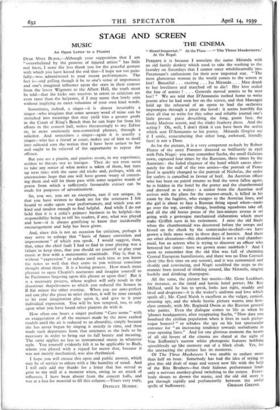THE CINEMA
" Hotel Imperial." At the Plaza - " The Three Musketeers.'
At the Regal.
PERHAPS it is because I associate the name Miranda with an old family donkey which used to take the washing to the
laundry on Saturdays that I cannot enter wholeheartedly into Paramount's enthusiasm for their new imported star. "The most glamorous woman in the world comes to the screen at last! Beautiful . . . exciting . . . Isa Miranda . . . Men drank to her loveliness and marched off to die! Her love sealed the fate of armies ! . . . Generals moved armies to be near her! " We are told that D'Annunzio rushed home to write poems after he had seen her on the screen, and that Mascagni held up the rehearsal of an opera to lead the orchestra impromptu through a piece she loved : it seems horribly flat after all that to write for this sober and reliable journal one's little prosaic piece describing the long, gaunt face, the husky Marlene accent, and the slinky feathery dress. And the acting ? Oh, well, I don't think it can have been the acting which sent D'Anmuizio to his poetry. Miranda (forgive me if I smile, remembering that other long, awkward, friendly face) is not a Duse.
As for the picture, it is a very competent re-hash by Robert Florey of the story Pommer directed so brilliantly in 1926 with Pola Negri: you may remember Sucha, the small Galician town, captured four times by the Russians, three times by the Austrians : the faded elegance of the hotel which caters alter- nately for the staff of the two armies—the portrait of Franz Josef is quickly changed to the portrait of Nicholas, the order for cutlets is cancelled in favour of beef. An Austrian officer who has been on patrol returns to find the town fallen again; he is hidden in the hotel by the porter and the chambermaid and dressed as a waiter : a traitor from the Austrian staff arrives with the plans for the counter-attack, is killed in his room by the fugitive, who escapes to the Austrian lines, and the girl is about to face a Russian firing squad when—tanks go over the top, cavalry charge, bombing squadrons take off, and all the old hocus pocus of the last-minute rescue is set going with a grotesque mechanised elaboration which must make Griffith turn in his retirement. I miss the old finale when the chambermaid was decorated before the troops and kissed on the cheek by the commander-in-chief—we have grown a little more wary in these days of heroics. And there are other alterations—this chambermaid is not a real chamber- maid, but an actress who is trying to discover an officer who betrayed her sister : have we grown more snobbish ? And I seem to remember that the old film was full of charming Central European humiliations, and there was no Don Cossack choir (the first time on any screen), and it was economical and shoddy and convincing, and Negri scrubbed the steps to the manner born instead of slinking around, like Miranda, singing huskily and drinking champagne.
All the same, the picture has merits—Mr. Gene Lockhart, for instance, as the timid and heroic hotel porter; Mr. Ray Millard, until he has to speak, looks just right, muddy and tired and desperate—it is the waiter's uniform and love which spoils all ; Mr. Carol Naish is excellent as the vulgar, cynical, amusing spy, and the whole heroic picture warms into first- class comedy, with Mr. Reginald Owen as the Russian general who paints. Even the dialogue comes to life as when he 'phones headquarters, after recapturing Sucha, " How dare you bombard the civilian population when it lives in such pictur- esque houses? " or rebukes the spy on his last spectacular entrance for " an increasing tendency towards melodrama in your opening lines." And for one glorious moment the hearts of all old lovers of the cinema are elated at the sight of Von Seiffertitz's narrow white photogenic features bobbing speechlessly up like memory out of a black cloak. Yes, for the unexacting the picture has its moments.
Of The Three Musketeers I was unable to endure more than half an hour. Somebody has had the idea of trying to give this old drab of stage and screen new life with the help of the Ritz Brothers—but their hideous performance lends only a nervous monkey-gland twitching to the corpse. Every- body shouts to drown the music, and the old old story is got through rapidly and perfunctorily between the awful






































 Previous page
Previous page